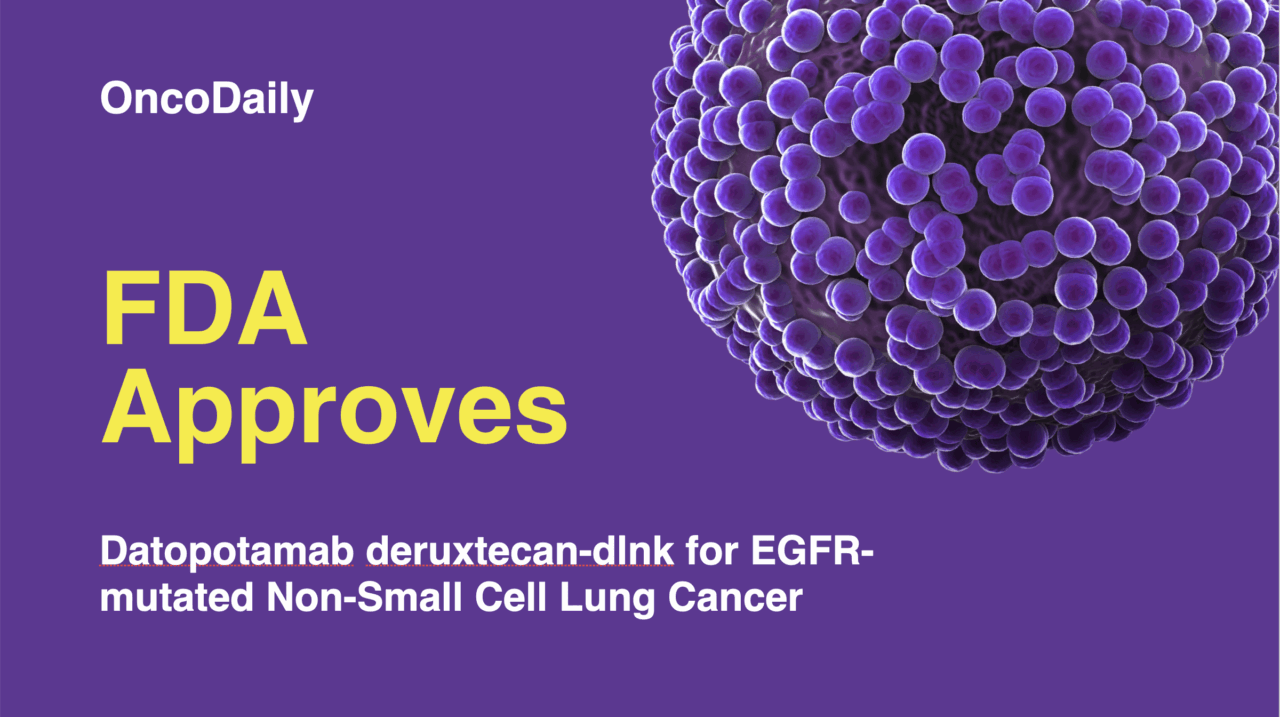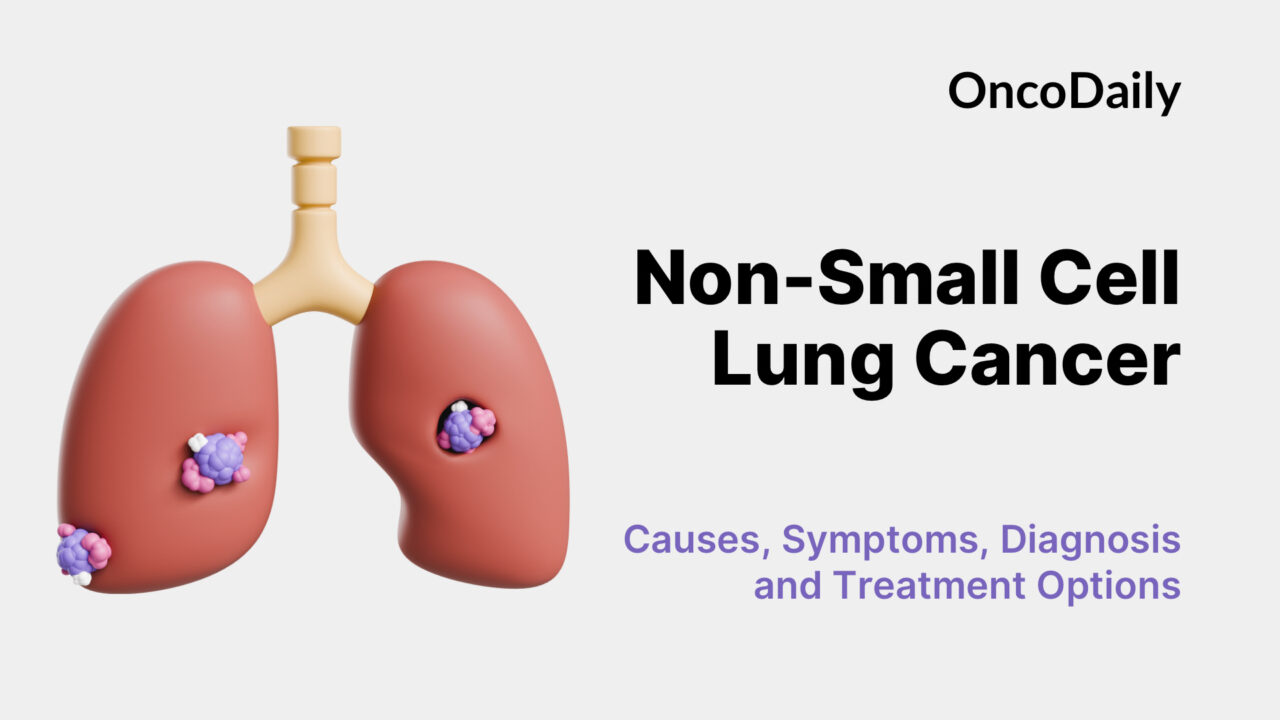
FDA Grants Accelerated Approval to Datopotamab Deruxtecan-dlnk for EGFR-Mutated Non-Small Cell Lung Cancer
On June 23, 2025, the U.S. Food and Drug Administration (FDA) granted accelerated approval to the TROP-2-directed antibody-drug conjugate datopotamab deruxtecan-dlnk for adults with locally advanced or metastatic non-small cell lung cancer (NSCLC) whose tumors carry an epidermal growth factor receptor (EGFR) mutation and have progressed after both an EGFR-targeted therapy and platinum-based chemotherapy.
What is EGFR-Mutated NSCLC?
According to the American Cancer Society (ACS), lung cancer (small cell and non-small cell combined) remains the second most frequently diagnosed malignancy in both men and women in the United States—trailing only prostate cancer in men and breast cancer in women. For 2025, ACS projects about 226,650 new lung-cancer cases (110,680 men; 115,970 women) and 124,730 deaths (64,190 men; 60,540 women).
NSCLC accounts for about 87 % of all lung cancers and remains the leading cause of cancer death worldwide. EGFR-activating mutations—most commonly exon 19 deletions and exon 21 L858R substitutions—occur in roughly 10–15 % of U.S. patients (higher in Asian populations) and drive tumor growth by chronically activating downstream signaling pathways. Although EGFR-tyrosine-kinase inhibitors (TKIs) such as osimertinib have revolutionized first-line care, nearly all tumors eventually develop resistance, leaving a significant unmet need for effective, well-tolerated later-line options.

Learn more about Non-Small Cell Lung Cancer: Causes, Symptoms, Diagnosis, Treatment Options, and Latest 2025 Advances in Targeted and Immunotherapy on OncoDaily.
How Datopotamab Deruxtecan Works?
Datopotamab deruxtecan (Dato-DXd) couples a humanized IgG1 antibody against the trophoblast cell-surface antigen-2 (TROP-2) with a cleavable linker and a highly potent topoisomerase I inhibitor payload (DXd). After the antibody docks on TROP-2-expressing tumor cells, the conjugate internalizes and releases DXd intracellularly, causing DNA damage and immunogenic cell death while limiting systemic exposure.
Efficacy and Safety Summary Behind the FDA Decision
The U.S. Food and Drug Administration fast-tracked datopotamab deruxtecan-dlnk after a pooled analysis of 114 adults with EGFR-mutated, locally advanced or metastatic non-small cell lung cancer (NSCLC) who had already progressed on both an EGFR-targeted tyrosine-kinase inhibitor and platinum chemotherapy. Patients in the single-arm TROPION-Lung05 and randomized TROPION-Lung01 studies received Dato-DXd 6 mg/kg every three weeks. Blinded central review confirmed that nearly half achieved significant tumor shrinkage, validating Dato-DXd as a high-impact option when standard care fails.
Key Efficacy Results
Across both trials, the overall response rate was 45 % (95 % CI 35–54), and the median duration of response reached 6.5 months (95 % CI 4.2–8.4). These figures underscore Dato-DXd’s ability to deliver meaningful and lasting disease control in a heavily pre-treated population with limited alternatives.
The updated FDA label highlights class-specific antibody-drug-conjugate toxicities. Physicians should monitor for interstitial lung disease/pneumonitis, ocular adverse reactions, stomatitis, and embryo-fetal toxicity. ILD remains the most serious concern, requiring immediate dose interruption and prompt evaluation if new pulmonary symptoms occur.

Learn more about Antibody-Drug Conjugates and Their Ocular Effects in Cancer Treatment: Efficacy and Toxicity on OncoDaily.
Dosing Guidelines for Datroway
The approved dose is 6 mg/kg intravenously (maximum 540 mg for patients ≥ 90 kg) every 21 days. Treatment continues until disease progression or unacceptable toxicity, with mandatory dose adjustments for grade ≥ 2 ILD/pneumonitis or other severe adverse events.
You can find more information about Datopotamab Deruxtecan-dlnk on AstraZeneca and Daiichi Sankyo official websites.
TROPION-Lung01 for NSCLC
The global, open-label Phase III TROPION-Lung01 trial (NCT04656652) randomised 604 adults with previously treated, advanced or metastatic non-small cell lung cancer to receive either datopotamab deruxtecan or docetaxel every three weeks. Blinded independent review showed that datopotamab deruxtecan prolonged median progression-free survival to 4.4 months compared with 3.7 months for docetaxel (hazard ratio 0.75; P = .004), a benefit largely driven by the nonsquamous cohort, where progression-free survival reached 5.5 months.
Overall survival favoured the antibody–drug conjugate numerically (12.9 vs 11.8 months) but did not cross the prespecified significance boundary, while grade ≥3 treatment-related adverse events were less frequent than with docetaxel (25.6 % vs 42.1 %). Interstitial lung disease or pneumonitis of any grade occurred in 8.8 % of patients receiving the conjugate, reinforcing the need for respiratory vigilance. These findings were published in the Journal of Clinical Oncology in September 2024.

TROPION-Lung05 for NSCLC
TROPION-Lung05 (NCT04484142) was a Phase II, single-arm, multicentre study that enrolled 137 heavily pre-treated patients whose advanced or metastatic lung tumours carried actionable genomic alterations and had progressed after targeted therapy and platinum chemotherapy. Treatment with datopotamab deruxtecan every three weeks produced a confirmed overall response rate of 35.8 % across the full cohort and 43.6 % in the EGFR-mutated subset, with responses lasting a median of 7.0 months and an overall disease-control rate of 78.8 %.
Grade ≥3 treatment-related toxicities arose in 28.5 % of participants; stomatitis was the most common high-grade event, and adjudicated interstitial lung disease or pneumonitis was seen in 3.6 % of patients, including one fatal case. The complete results appeared in the Journal of Clinical Oncology in January 2025.

What Cancers Is Datopotamab Deruxtecan Approved For?
On January 17 2025, the FDA cleared the Trop-2–directed antibody–drug conjugate datopotamab deruxtecan-dlnk (Datroway™) for adults with unresectable or metastatic, hormone-receptor-positive, HER2-negative breast cancer whose disease progressed after endocrine therapy and at least one prior chemotherapy line. In the phase III TROPION-Breast01 trial (n = 732), Datroway extended median progression-free survival to 6.9 months versus 4.9 months with investigator-choice chemotherapy (HR 0.63; p < 0.0001) and increased the confirmed objective response rate to 36 % compared with 23 %.
Overall survival was similar between study arms (18.6 vs 18.3 months). The safety profile was dominated by stomatitis, nausea, fatigue, and cytopenias, with grade ≥ 3 treatment-related events in about one-fifth of Datroway recipients. The labeled dose is 6 mg/kg IV (max 540 mg for patients ≥ 90 kg) every three weeks until progression or unacceptable toxicity.
Read more about datopotamab deruxtecan-dlnk’s FDA approval for unresectable or metastatic, HR-positive, HER2-negative breast cancer on OncoDaily.
-
Challenging the Status Quo in Colorectal Cancer 2024
December 6-8, 2024
-
ESMO 2024 Congress
September 13-17, 2024
-
ASCO Annual Meeting
May 30 - June 4, 2024
-
Yvonne Award 2024
May 31, 2024
-
OncoThon 2024, Online
Feb. 15, 2024
-
Global Summit on War & Cancer 2023, Online
Dec. 14-16, 2023
